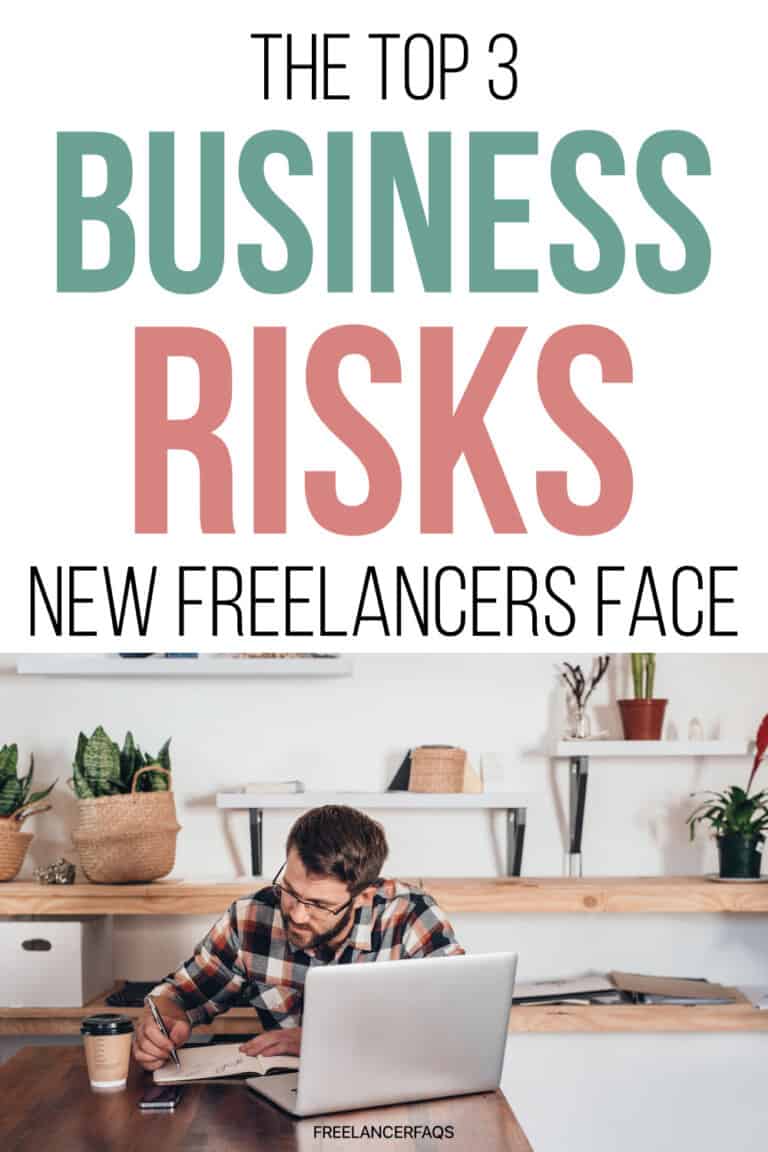The freelance life can be a route to greater autonomy in your business. You can work around a schedule more suited to your personal priorities.
You get to target projects of interest to you.

While there are risks associated with almost any business profession, these can feel more pronounced when you’re a new freelancer.
Not to mention, in many cases, you can work from wherever you happen to be in the world as a new freelancer with a business.
Yet, alongside these benefits, there are many business risks you need to watch out for.
Chief among these business risks is the fact you’re frequently confronted with risks.
While there are risks associated with almost any business profession, these can feel more pronounced when you’re a new freelancer.
This is often because you are operating as an independent business and the hazards are entirely on your shoulders.
The presence of these can impact your mental wellness, your professional efficacy, and the daily decisions you make. As such, it is in your best interest to have risk management done effectively.
We’re going to review some of the prevalent business risks and how you can address them.
Business Risk Ideas You May Face
While trying to find clients and managing your freelance work, you may run across scams or wonder if you’re dealing with legit businesses.
A proper risk analysis must happen so you don’t fall for these “traps.”
Let’s check out three main business risks you may encounter.
1. Financial Elements
Perhaps the primary risk for freelancing is it has a reputation for being a financially unstable profession.
This perception is one of the reasons banks are often hesitant to provide freelancers with mortgages and personal loans.
The risk here isn’t that freelancing is any less financially stable than a job with a large corporation that might make you redundant during uncertain economic times.
Rather, it comes down to the flow of money.
Addressing the financial risks of freelancing involves running your profession as an entrepreneur rather than an occasional employee.
You’ll be registering as a form of business, so you may as well start acting like one.
You need to have a clear understanding of where your work can come from months in advance rather than thinking one project at a time.
To be financially stable, you have to remember that only part of your job is performing tasks for clients; you need to keep prospecting and pitching, too.
Another key to addressing financial risks is setting up multiple streams of revenue.
Alongside the active stream of your work for clients, find passive forms of income.
This may be producing merchandise if you’re a graphic designer or YouTube videos about your area of expertise if you’re a consultant.
If you can, put some of your income into an investment portfolio.
There will be points of feast and famine as a freelancer, so save back what you can from the busy times so you have a cushion during the difficult periods.
2. Cybercrime
 Our society is increasingly technologically reliant.
Our society is increasingly technologically reliant.
This is especially true when it comes to business operations.
As such, your clients are likely to have certain expectations about your level of engagement with digital tools.
They may require you to share documents via cloud platforms, connect to their business networks, or use their collaborative project management software.
Unfortunately, significant engagement with online technology can put you at risk of cybercrime – and is a huge business risk.
Data breaches are of particular concern in this regard.
The information shared between you and your clients may be financial, operational, or proprietary.
This makes it valuable to cybercriminals.
When breaches occur, the theft of data can have serious financial, legal, and consumer trust repercussions for the businesses you work with.
It is, therefore, vital to address this risk by adopting robust data security measures.
This includes utilizing two-factor authentication protocols and keeping antivirus software up-to-date.
Inadvertently leaked information is not the only cybersecurity risk you need to address as a freelancer.
Malware and ransomware can still disrupt your activities even if no data is stolen.
As such, you need to become familiar with the practices criminals use to infect your devices.
Sending malicious attachments in emails, infected links, and visiting unsafe websites are all common approaches.
Antivirus software and using virtual private networks (VPNs) when you’re in a public place can help.
But the most important risk mitigation comes from your behavior.
By building cyber-safe practices into all your activities, you can keep your systems, your clients, and your reputation secure.
3. Relative Business Risks
Any profession has its business risks and hazards.
Some of these will be more well-publicized, like those financial and security aspects we’ve covered.
However, your business is also subject to risks that can fluctuate depending on the industry, location, or even the people you’re working with.
These elements can also change over time and as circumstances develop.
Your ability to effectively identify and manage these relative risks can be key to your performance as a freelancer.
You need to assess the factors that can influence your particular approach to your freelance business.
These could include:
1. Industry Issues
Even within your freelancing skill specialization, you’re likely to be focused on a couple of key industries.
You need to be cognizant of issues occurring within your target industries.
Are there technological changes that could leave you lagging behind? Are businesses shifting to automated practices you may be replaced by?
2. Economic Situation
The economy has a serious impact on contracted professionals.
When there is economic uncertainty in the city, industry, or country your clients are operating in, freelancers are often vulnerable to losing work.
Staying abreast of economic issues can help you make appropriate adjustments.
3. Physical Dangers
Depending on your professional focus, you may find you need to work with clients on-site.
This has the potential to present hazards to your wellbeing, particularly if you’re operating in industries like construction or manufacturing.
Not only do you need to be aware of the dangers involved, but also of what healthcare and workers comp coverage your clients provide if you are injured on their premises.
The assessments you perform on these relative risks shouldn’t just be a one-time activity.
Because the risks shift, you should regularly review for their presence. This keeps you informed and better able to respond accordingly.
Be Careful of these Business Risks
A freelancing career can be a rich and interesting path.
But, as with any profession, there are some risks involved.
Financial uncertainty and cybercrime are among the most common issues.
However, you also need to be aware of the fluctuating hazards impacting specific industries and clients you work with.
By taking time to assess and address the risks, you can have a positive and successful freelancing experience.



Leave a Reply